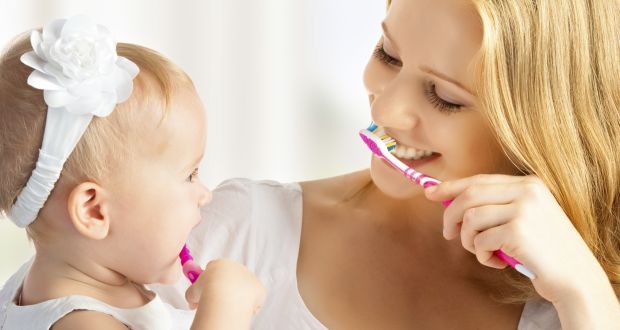A dentist’s primary goals are prevention (heading off potential problems before they occur) and maintenance (using routine check-ups and proper daily care) to keep teeth and gums healthy.
Table of Contents
ToggleWhen To Start kids Dental Care?
Around age 2, most kids can spit while brushing. Use a pea-sized amount of toothpaste, with supervision, until around age 5.

Even babies can develop tooth decay if good feeding habits aren’t practiced. Putting a baby to sleep with a bottle might be convenient, but can harm your baby’s teeth. When the sugars from juice or milk remain on a baby’s teeth for hours, they can eat away at the enamel, creating a condition known as bottle mouth decay.
Pocked, pitted, or discoloured front teeth are signs of bottle mouth decay. Severe cases result in cavities and the need to pull all of the front teeth until the permanent ones grow in.
Parents and childcare providers should help young kids set specific times for drinking each day because sucking on a bottle throughout the day can be equally damaging to young teeth.
Preventing Cavities In kids
We recommend that a child’s first visit to the dentist take place by the first birthday. At this visit, the dentist will explain proper brushing techniques and conduct a modified exam while your baby sits on your lap. You can read here Child teeth care at home -Age-wise guide
Such visits can help in the early detection of potential problems, and help kids become used to visiting the dentist so they’ll have less fear about going as they grow older.
If a child seems to be at risk for cavities or other problems, the dentist may start applying topical fluoride or pit & fissure sealants. Home Fluoridated tooth paste hardens the tooth enamel, helping to prevent the most common childhood oral disease — dental cavities (also called dental caries).
Cavities occur when bacteria and food left on the teeth after eating are not brushed away. Acid collects on a tooth, softening its enamel until a hole — or cavity — forms. Regular use of fluoride toughens the enamel, making it more difficult for acid to penetrate.
Most toothpaste contains fluoride but toothpaste alone will not fully protect a child’s teeth. Be careful, however, since too much fluoride can cause tooth discoloration. Check with your dentist before supplementing.
Discoloration also can occur from prolonged use of antibiotics, and some children’s medications that contain a large amount of sugar and iron. Parents should encourage kids to brush after they take their medicine, particularly if the prescription will be used for a long time.
Brushing at least twice a day will help maintain a healthy mouth. Kids as young as age 2 or 3 can begin to use toothpaste when brushing, under supervision. Kids should not use a lot of toothpaste — a pea-sized amount for toddlers is just right. Parents should always make sure that kids spit out the toothpaste instead of swallowing.
As your child’s permanent teeth grow in, the dentist can help seal out decay by applying a thin wash of resin to the back teeth, where most chewing occurs. Known as a sealant, this protective coating keeps bacteria from settling in the hard-to-reach crevices of the molars.
Dental research has resulted in better preventive techniques, including fillings and sealants that seep fluoride, but seeing a dentist is only part of good tooth care.
Home care is equally important. For example, sealants on the teeth do not mean that a child can eat lots of sweets or skip daily brushing — parents must work with kids to teach good oral health habits.
Common dental Problems in child
- Teething problems
- Tooth decay & gum swelling
- Malalign teeth or irregular teeth
- Abnormal Oral habits
![]()
As kids grow, plan on routine dental check-ups ones in every year, depending on the dentist’s recommendations. Limiting intake of sugary foods and regular brushing contribute to a child’s dental health. Your partnership with the dentist will help ensure healthy teeth and a beautiful smile.
Our kids’ dental services are comprehensive right from fluoride treatment, milk teeth fillings, and habit breaking appliances to advanced diagnostics and treatment. Our collective experience in both adult and paediatric dentistry is extensive and we can advise you on the best and safest course of action for any dental problem your child may have.

